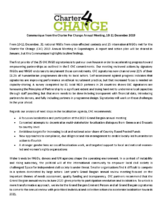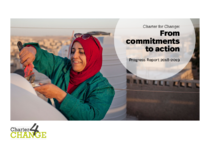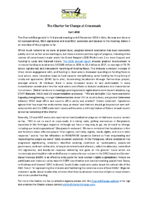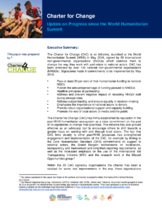This site is inactive as of February 2020. For updated information on an initiative's work, please refer to their own website as listed in their contact details.
Summary
Local and national civil society organisations are among the first responders to disasters and outbreaks of violence. The recent Global Humanitarian Assistance report stated however that a mere 0.4% of humanitarian aid is channeled directly to national NGOs and Civil Society organisations.
The Charter for Change is an initiative that aims to transform the way the humanitarian system operates to enable local and national actors to play an increased and more prominent role in humanitarian response.
International NGOs are encouraged to play an active part in this transformation towards a more locally-driven humanitarian system by changing the way that they work. The 8-point Charter for Change outlines a number of commitments intended to strengthen the capacity of local actors, increase transparency within the sector and emphasise the importance of national actors in humanitarian response. Alongside advocacy to governments which are humanitarian donors, those signed up to the charter have committed that by 2020, they will pass on at least 25% of their own humanitarian funding directly to local and national NGOs.
During the recent Grand Bargain and ECOSOC events in Geneva, Charter4Change analyses the changes that it feels are most critical now to achieve faster and deeper progress on the localisation agenda. We call upon the international community to:
#1: Strengthen principled partnership through multi-year funding, covering overhead costs, and investing in capacity-strengthening
#2: Mitigate the impact of proliferating compliance requirements on localisation efforts
#3: Accelerate progress on direct humanitarian funding to national and local actors at global and country levels
#4: Catalyse a step-change in meaningful participation by local actors across the Grand Bargain and wider decision-making processes at global and field levels
More details at: https://charter4change.files.wordpress.com/2019/06/c4c-altp-recs-gb-localisation-june-2019.pdf
Partners
The Charter for Change was launched in July 2015 by CAFOD, Christian Aid, DanChurchAid and ADESO and has now been signed by 35 INGOs (including Oxfam, CARE, and Islamic Relief) and endorsed by more than 300 local and national organisations and networks from across the globe. See all signatories here - https://charter4change.org/signatories/ and endorsements here - https://charter4change.org/endorsements/.

Goals
The Charter for Change includes 8 Commitments that INGOs agree to implement by 2020 to change the way they work with and relate to national organisations:
- Direct Funding: Commit to pass 25% of humanitarian funding to national and local NGOs by 2020
- Partnership: Reaffirm the 2007 UN/NGO Principles of Partnership
- Transparency: Publish the amount or percentage of funding that is passed to national and local NGOs
- Recruitment: Address and prevent the negative impact of recruiting national and local NGOs staff
- Advocacy: Emphasise the importance of local and national actors to humanitarian donors
- Equality: Address subcontracting and ensure equality in decision-making
- Support: Provide robust organisational support and capacity building
- Promotion: Promote the role of local and national actors to media and public
For clarity, the Charter has used the GHA categorisation which defines 5 categories of NGOs: international NGOs, southern international NGOs, affiliated national NGOs (which are part of an INGO family), national NGOs and local NGOs.
Resources








 summary
summary partners
partners goals
goals Stakeholder reports
Stakeholder reports resources
resources contacts
contacts